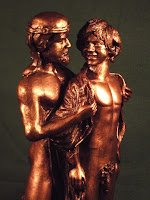history and just knowing my kid, I might know what it is she wants, but often I have no idea. And even if I DO know, I'm likely to say, "Use your words, please." You may be chuckling right now - either out of personal experience or just a general sense of how kids are - but the reality is that non-verbal behavior is NOT limited to children. Breakdowns in communication, or just flat-out NO communication, are common among adults as well. And sadly, their repercussions can often be MUCH more dire. A fundamental building block of any society is relationship; and often the way we know if a relationship is firm or unstable is through communication. Do you know what I'm saying?
Translating this relationship/communication conversation to a Jewish framework, I really like a description that I once heard, which stated that the prayers we recite from the Siddur are OUR way of speaking to God; while the chanting of the Torah
portion every week is God's way of speaking back to us. In essence, it's a dialogue. The problem, however, is that we are often not listening. Our Torah portion includes an important command, namely "Kedoshim Tihyu, Ki Kadosh Ani Adonai Eloheichem" - "You [the people] shall be holy, for I, Adonai, your God, am holy" (Lev. 19:2). And then the Torah goes on to list a long series of commandments and behaviors that will help keep the relationship strong. They will bind us to God, and allow us to hold on to God's favor. But then, the Haftarah which our ancestors chose to link to this Torah portion cries out a different message altogether.
It comes from the prophet Amos, who railed against the people for their sinful behavior. He proclaims: "All the sinners of My people shall perish by the sword, [those] who boast: 'Never shall the evil overtake us or come near us'" (9:10). Yikes! Clearly a serious breakdown in understanding. God is incredibly angry, and our ancestors continue to pretend they're invincible.
Perhaps most hurtfully, Amos exclaims, "To me, O Israelites, you are just like the Ethiopians." In essence, he's saying "You think you're so special? I've got a relationship with ALL my children, you dope! Clean up your act!!!" I'm paraphrasing, of course... But the reason I am highlighting this for all of us, is that the rabbis are using a subtle technique to convey a message to US; not just to an ancient audience. Relationships - whether Divine or between humans - take CONSTANT work. We started out super-holy and super-connected. A rock-solid relationship with Adonai. And yet, it's actually more fragile than it appears. Every year, make sure to read Amos along with Leviticus, because you HAVE TO remember that all relationships and important connections between individuals require work, maintenance, and consistent communication.
This issue has especially been on my mind this week. I led a discussion with our Sisterhood about Interfaith relationships, Same-sex marriage, and Transgender inclusion. We mainly focused on the overarching principle of who is "in" and who is "out," and how can we widen our circle, open our arms, and most importantly,
CONVEY that we live our principles; we don't just talk about them. Two days later, I led a very different discussion with Men's Club, about the pervasive loneliness of men in society. In particular, our lack of communication, our inability to be vulnerable and to reach out to others for help, and our insistence on declaring over and over "I'm fine" (when we're not), is truly harming us males. I also attended a relationship-building retreat with members from Ohev and another nearby shul, Beth Israel. In short, I feel this is an extremely important topic. I'm going to stop talking now. But that means YOU have to pick up the baton. What's going on with you? When do you keep emotions shoved down deep inside, when they desperately cry out for release?? Don't wait. Remember Amos' prophecies, don't rest on your laurels and just HOPE it'll all be fine. Act now. I'm listening...
Photos in this blog post:
1. Image of my children, Caroline and Max, playing outside our house, April 2018
2. Image from the Bar Mitzvah of Seth Fein, November 2010
3. CC image courtesy of QUOI Media on Flickr











